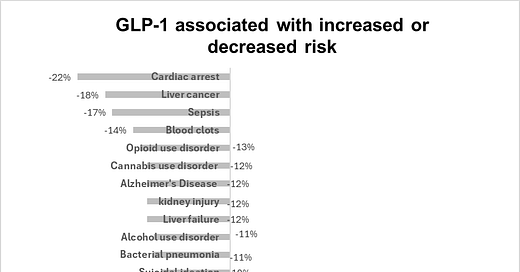Source: Xie, et al, Nature Medicine, January 20, 2025
Researchers published a comprehensive review of electronic medical records from the Veterans Administration (VA) to demonstrate the benefits and harms of GLP-1 medications. The research was published in Nature Medicine this week. The study is large (following almost two million people for an average of 3.7 years) and included over 215,000 people on GLP-1 drugs. These results might not apply directly to employer-sponsored health plans as the VA’s population is older and more male than the populations of employer-sponsored health plans. The sample included about 18% Black people and 5% women, and about 30% of those studied were under 60 years of age.
The researchers looked at 175 potential adverse outcomes and found that GLP-1 drugs lowered the likelihood of 42 of these outcomes and increased the likelihood of 19 adverse outcomes. The chart above shows a selection of these outcomes. The likelihood of drug-induced pancreas inflammation is about 2 ½ times higher with GLP-1s, but I’ve omitted this from the graph since it would make the other changes too small to visualize.
This is an observational study and does not prove causality. This study reviewed benefits and harms in people with diabetes, and so it is not certain that the same results would be achieved by treatment with GLP-1s for obesity without diabetes.
Implications for employers:
This study is consistent with other studies of GLP-1 medications for both diabetes and obesity demonstrating substantial cardiovascular and metabolic benefits of this class of medications.
Employers should recognize that in addition to high prices, these drugs can lead to adverse outcomes in some members. Still, the impressive clinical benefits appear to far outweigh the adverse effects.
This demonstrates the benefit of large electronic medical record databases to identify real-world impact of treatments. More research may be done as a result of this observational study.
Thanks for reading! Hope you’ll subscribe to this newsletter, and please hit the "like" button. Please also recommend to friends and colleagues - it's free. You can find previous posts at this link.
Tomorrow: FIT tests were more cost effective than blood tests for colorectal cancer screening



